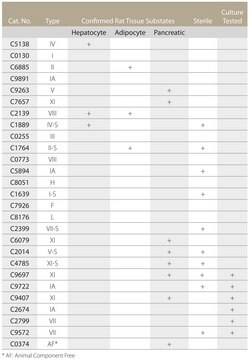D6421
DMEM/F-12
With HEPES, sodium bicarbonate and sodium pyruvate, without ʟ-glutamine, liquid, sterile-filtered, suitable for cell culture
Synonym(s):
DME/Nutrient Mixture F-12 Ham, DMEM Hams F12, DME/F-12, 1:1 mixture
About This Item
Recommended Products
Product Name
Dulbecco′s Modified Eagle′s Medium/Nutrient Mixture F-12 Ham, With 15 mM HEPES and sodium bicarbonate, without L-glutamine, liquid, sterile-filtered, suitable for cell culture
Quality Level
sterility
sterile-filtered
form
liquid
technique(s)
cell culture | mammalian: suitable
impurities
endotoxin, tested
components
sodium pyruvate: 0.055 g/L
L-glutamine: no
phenol red: yes
NaHCO3: yes
HEPES: 15 mM
glucose: 3.15 g/L
shipped in
ambient
storage temp.
2-8°C
Looking for similar products? Visit Product Comparison Guide
General description
Application
Dulbecco′s Modified Eagle′s Medium/Nutrient Mixture F-12 Ham is used in cell culture & proliferation assays. It is also used in bone marrow-derived macrophages culture.
Reconstitution
also commonly purchased with this product
related product
supplement
Storage Class Code
12 - Non Combustible Liquids
WGK
WGK 1
Flash Point(F)
Not applicable
Flash Point(C)
Not applicable
Choose from one of the most recent versions:
Already Own This Product?
Find documentation for the products that you have recently purchased in the Document Library.
Customers Also Viewed
Our team of scientists has experience in all areas of research including Life Science, Material Science, Chemical Synthesis, Chromatography, Analytical and many others.
Contact Technical Service








